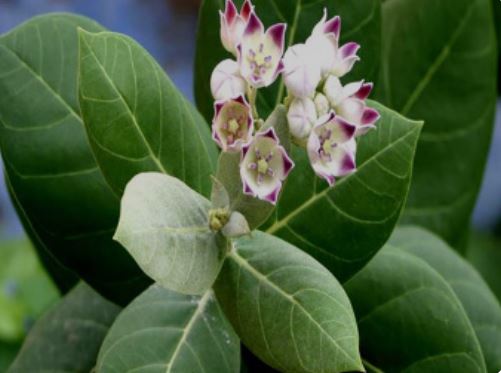A Comprehensive Review on the Anticancerous Activity of Arka (Calotropis procera)
DOI:
https://doi.org/10.21760/jaims.9.9.39Keywords:
cancer, arka, calotropis procera, anticancer, Anticancerous Activity, UpavishaAbstract
Cancer incidence is increasing both in India and around the world. According to World Health Organization (WHO) estimates for 2019, cancer is the primary or second major cause of death before the age of 70 in 112 of 183 countries, And third or fourth in another 23 countries. The estimated mean relative proportions showed that oral, breast, and cervical cancers remained the leading causes of cancer in India. Medicinal plants include several phytochemicals that are used to synthesize active medicinal compounds, making them extremely important. Arka (Calotropis procera), a plant revered in traditional medicine for its strong medicinal effects, has been shown to have anticancer potential. Calotropis procera is a plant that grows abundantly over the world. Bhavprakasha and Rasatarangini classify Calotropis procera (Arka) as an Ayurvedic Upavisha. This plant includes numerous phytochemical compounds, including cardenolides, benzoyllineolone, calactin, and calotropagenin. These phytochemicals have been examined and proven beneficial against a variety of diseases. By combining traditional knowledge with modern scientific research, this study intends to highlight Calotropis procera's potential as a source of novel anti-cancer drugs and to guide future research paths in this area. This review highlights numerous in vitro and in vivo investigations on the anticancer efficacy of Upavisha Arka.
Downloads
References
American Cancer Society. Cancer Facts & Figures 2020. Atlanta: American Cancer Society, 2020; 56.
Cancer Research, Statistics, and Treatment / Volume 3 / Issue 4 / October-December 2020 http://www.crstonline.com
Bhagat M, Arora J, Saxena A. “In vitro cytotoxicity of extracts and fractions of Calotropis procera (Ait.) roots against human cancer cell lines. International Journal of Green Pharmacy, 2010; 36-40.
Magalhes H, Ferreson P, Maura E, Torres M, Alves A, Pressia O, CostaLutifo L, Moraes M, Claddiopessoa, “In vitro and In vivo antiproliferative activity of Calatropis procera stem extract” Annals of Brazzilian Academy of science, 2010; 82(2): 407-416.
Choedon T, Matham G, Arya S, Kumar V L, Kumar V, “ Anticancer and Cytotoxic properties of the latex of Calatropis procera in atransgenic Mouse model of Hepatocellular Carcinoma” World J Gastroenterol, 2006; 12(16): 2517-2522.
Eric Wei Chiang Chan, Nuha I. Sweidan, Siu Kuin Wong et al. Cytotoxic Cardenolides from Calotropis Species: A short Review. Records of Natural Products, 2017; 11(4): 334-344.
Ali Esmail Al-Snafi. The constituents and pharmacological properties of calotropis procera- an overview. International Journal of Pharmacy Review & Research, 2015; 5(3): 259-275.
Anagha R, Rabinarayan A. Pharmacotherapeutic archives of arka. Journal of Medicinal Plants Studies, 2016; 4(4): 94-108.
Sharma P V, Dravyaguna Vigyan, Chaukhamba Bharti Academy, Varanasi. Reprint, 2001; 2: 433-436.
Sharma P. C, Yelne M. B, Dennis T. J. Database on Medicinal Plants used in Ayurveda. Central Council for Research in Ayurveda and Siddha. New Delhi., 2005; 2: 69-72.
Chandankhede Aditi Vasudeorao et al. A review on pharmacological action of Arka Lavana: the formulation of Upavisha Arka. J. Pharm. Sci. Innov, 2021; 10(1).
Murti, Y., Agrawal, K.K., Jyoti. Anticancer Potential of Calotropisprocera: An Overview. Discovery Phytomedicine, 2021; 8(2): 93-106.
Murti Y, Sharma S, Mishra P. In vitro cytotoxicity of Chromatographic Elutes of Calotropis Procera (Ait) R Br. Leaves against Human Hepatoma Cell line (HEPG2). Indian Drugs, 2016; 53(5): 48-52. 35.
Hassan Swed Alzahrani, Safar A. Almalki, Mohamed R. Rizgallah. Study of the cytotoxic effect of Calotropis procera on Breast Cancer Cell line T47D in Vitro: A Traditional Remedy. International Journal of Scientific Innovations, 2019; 7(1): 107-112.
Bhagat M, Sharma V. Anti-cancer activity of Arka (Calotropis procera) on HCT-15 Cancer Cell Line. International journal of medical science, 2010; 2(2): 152-154.
Mathur R, Gupta SK, Mathur SR, Velpandian T. Anti-tumor studies with extracts of Calotropis Procera (Ait.) R.Br. root employing Hep2 cells and their possible mechanism of action. Indian Journal of Experimental Biology, 2009; 47: 343-348.
Alzahrani HS et al. Anticancer and Antibacterial Activity of Calotropis procera Leaf Extract. Journal of Basic and Applied Scientific Research, 2017; 7(12): 18-25.
Ouedrago GG, Moukha S, Mobio TA, Ouedraogo M, Guissou P.I., Creepy EE. Cytotoxicity assessment of aqueous extract from root barks of Calotropis procera (Ait.) R. Br. In human intestinal Caco-2 and mouse neuroblastoma Neuro-2a cell lines. Journal of Applied Pharmaceutical Science, 2014; 4(4): 001-007.















